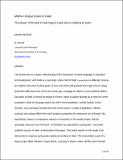| dc.contributor.author | DeGraff, Michel Anne-Frederic | |
| dc.date.accessioned | 2018-06-21T13:47:15Z | |
| dc.date.available | 2018-06-21T13:47:15Z | |
| dc.date.issued | 2017-03 | |
| dc.identifier.issn | 0033-1538 | |
| dc.identifier.issn | 1573-9090 | |
| dc.identifier.uri | http://hdl.handle.net/1721.1/116462 | |
| dc.description.abstract | This article aims at a deeper understanding of the importance of native languages in education and development, with Haiti as a case study. About half of Haiti’s population is illiterate. Among ten children who enter the first grade, at most one (10%) will graduate from high school; a large proportion will drop out of school at an early age. Language is a factor in such academic failure. Education in Haiti is carried out mostly in French, which is spoken fluently by at most 5% of the population, while the language spoken by 100% of the population, namely Haitian Creole (Kreyòl), is by and large excluded from the school system, in spite of legislation, official curricula, and various efforts from civil society to generalize the classroom use of Kreyòl. This article reports on the results of an intervention to improve early-grade reading and writing in Haiti. It argues that the systematic classroom use of Kreyòl—at all levels, but especially in early grades—promotes academic success. The article also draws implications for policy, to enhance reading and writing in Haiti. Keywords: Haiti, Haitian Creole (Kreyòl), Literacy Instruction in the mother tongue, Early Grade Reading Assessment (EGRA) | en_US |
| dc.publisher | Springer Netherlands | en_US |
| dc.relation.isversionof | http://dx.doi.org/10.1007/s11125-017-9389-6 | en_US |
| dc.rights | Creative Commons Attribution-Noncommercial-Share Alike | en_US |
| dc.rights.uri | http://creativecommons.org/licenses/by-nc-sa/4.0/ | en_US |
| dc.source | Springer Netherlands | en_US |
| dc.title | Mother-tongue books in Haiti: The power of Kreyòl in learning to read and in reading to learn | en_US |
| dc.type | Article | en_US |
| dc.identifier.citation | DeGraff, Michel. “Mother-Tongue Books in Haiti: The Power of Kreyòl in Learning to Read and in Reading to Learn.” PROSPECTS, vol. 46, no. 3–4, Dec. 2016, pp. 435–64. | en_US |
| dc.contributor.department | Massachusetts Institute of Technology. Department of Linguistics and Philosophy | en_US |
| dc.contributor.mitauthor | DeGraff, Michel Anne-Frederic | |
| dc.relation.journal | PROSPECTS | en_US |
| dc.eprint.version | Author's final manuscript | en_US |
| dc.type.uri | http://purl.org/eprint/type/JournalArticle | en_US |
| eprint.status | http://purl.org/eprint/status/PeerReviewed | en_US |
| dc.date.updated | 2018-03-06T07:05:28Z | |
| dc.language.rfc3066 | en | |
| dc.rights.holder | UNESCO IBE | |
| dspace.orderedauthors | DeGraff, Michel | en_US |
| dspace.embargo.terms | N | en |
| mit.license | OPEN_ACCESS_POLICY | en_US |
